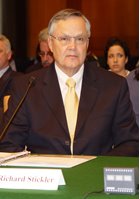 In deliberate defiance of Congress and the families of mineworkers killed on the job this year, President Bush has appointed Richard Stickler to head the Mine Safety and Health Administration. Because the Senate refused to confirm him, Bush made a recess appointment which he is allowed to do without Senate approval when Congress is out of session.
In deliberate defiance of Congress and the families of mineworkers killed on the job this year, President Bush has appointed Richard Stickler to head the Mine Safety and Health Administration. Because the Senate refused to confirm him, Bush made a recess appointment which he is allowed to do without Senate approval when Congress is out of session.Stickler was nominated to the post in September 2005, before the Sago disaster and other mine incidents that have raised this year's number of deaths to levels not seen in years, but his nomination was blocked in the Senate and sent back to the White House twice. Forty coal miners have been killed on the job so far this year, compared with 22 in all of last year.
There is nothing in Stickler's work history or public statements that show him to be the man best qualified for this job. Stickler made an completely unimpressive impression at his confirmation hearing. His appearance was less than dynamic, to put it mildly. Some observers quipped that they were tempted to check his pulse to see if he was alive. But it wasn't just his style that was lacking. As Charleston Gazette editors wrote in an editorial opposing Stickler's confirmation:
Despite widespread belief that more communication equipment and better safety enforcement might have saved at least 11 of those men [lost at Sago], Stickler told U.S. senators that current mine safety laws are “adequate.” A day later, two more miners died in separate incidents in Boone County.Senate Majority Leader Bill Frist was forced to cancel a vote on Stickler's confirmation last June due the lack of Senate support for Stickler's nomination. Then in August, in an unprecedented action, the Senate returned Stickler's nomination to the White House before it went on break. But refusing to take the hint, the President renominated Sticker at the beginning of September. The Senate was obviously not amused and again returned the nomination to the White House.
Senators Ted Kennedy and Robert Byrd have led the opposition to Stickler, citing his industry background and the lack of commitment to MSHA reform that he displayed at his confirmation hearing. The Mineworkers also called on Bush to withdraw the nomination, as did the AFL-CIO and the Charleston Gazette. In addition, widows of miners killed at Sago and other recent mine disasters wrote the White House opposing Stickler's nomination. At a signing ceremony for recent mine safety legislation, Deborah Hamner, whose husband, George Hamner, was killed at Sago, told the president in person that she opposed Stickler's nomination to head the Mine Safety and Health Administration.
Although the Labor Department boasts about Stickler's 37 years of mining experience, most of his career was spent in industry where the mines he managed had injury rates that were double the national average, according to government data assembled by the United Mineworkers. While managing mines for Bethlehem Steel, according to information assembled by the United Mineworkers union, the mines he managed had injury rates that were double the national average. According to former Mineworkers health and safety director Joe Main, the figures indicate “a very poor compliance record.”
“These figures would rank Stickler’s operations among the highest cited in the country,” Main wrote. “Collectively over the eight-year period, the federal government issued nearly 3,000 citations and closure orders at mines that Mr.In 1987, Stickler was appointed Director of the Pennsylvania Bureau of Deep Mine Safety and held that position when nine coal miners were trapped for three days in a flooded Quecreek mine until being rescued. The mine had flooded to to errors in mine maps. Despite White House boasts that Stickler "was one of the architects of the dramatic rescue," a grand jury determined after the flood that Stickler's bureau should have noticed the mapping problems sooner.
Stickler managed.”
The Senators from West Virginia were not pleased with Bush's recess appointment:
Sens. Robert C. Byrd and Jay Rockefeller, West Virginia Democrats, said the appointment indicates that the administration does not consider mine safety a priority.
"We need a bulldog agency that will place miner safety over all other priorities, and not an agency that will continue to place a higher priority on mine production than on miner protection," Byrd said in a statement.
MSHA had been operating without a permanent Assistant Secretary for almost two years since David Lauriski resigned in November 2004.
Related Stories
- Senate Returns Stickler To White House For Second Time, September 30, 2006
- Stickler Renominated To Head MSHA
- Senate Returns Stickler, Correll, Other Nominees Back To White House
- VICTORY: Senate Sticks It To Bush Mine Safety Nominee, June 13, 2006
- Bush Should Withdraw Mine Safety Nominee, May 21, 2006
- Stickler Nomination To Head MSHA Held Up By Senator Byrd
- Foulke, Sticker Get Committee Approval To Head OSHA & MSHA
- Opposition to Stickler As MSHA Head Grows , February 15, 2006
- Mineworkers Call On Bush To Withdraw Nomination of MSHA Head
- More on MSHA Nominee Richard Stickler, September 25, 2005
- Bush Nominates OSHA & MSHA Heads, September 15, 2005